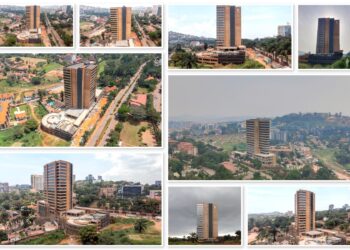By Denis Jjuuko
Stories are told of people who would wake up one morning and welcome a truck driver into their compound. The driver and a few men would pack all household items onto the truck. Once they were done, the man of the house would climb up the cabin to occupy the co-driver’s seat. The driver would start the vehicle and ask the passenger for directions. The passenger — a recently retired or retrenched civil servant under the structural adjustment policies of the 1990s would have no idea.
Sometimes the driver would offer shelter to his former boss or the boss would return to live in squalor conditions in the village. You have probably met somebody like that — speaks impeccable English, quick to list his academic qualifications and eager to namedrop. You see, previously your job entitled you to a house in a leafy suburb and a car. There was no need to build or buy a personal car. Doctors lived in decent houses in Mulago (could this be the reason they are asking for 5-bedroom mansions and three maids?). Professors in Makerere University had houses and public servants lived in ‘staff quarters’ in Kololo, Mbuya, and Ntinda among other decent suburbs. Life was good.
The children saw the stress their parents went through when they retired or retrenched because of downsizing. Remember, government companies were being privatized and advanced technologies and processes meant less reliance on human beings. Imagine a person who was employed to count money in Uganda Commercial Banks. They had to leave when machines that can count money faster were brought in. Or imagine a typist back in the day. Today, there is no job for such people (yet our universities still have such courses — an #OutToLunch post on that one day). By the way, this partly explains the corruption in this country. Nobody wants a Tata lorry (it was mostly a Tata lorry with Promote Cooperatives inscribed on its sides) to pick them up from a house and they have nowhere to go.
Anyway, once the children got employed, they were no free houses in Kololo or Mbuya to occupy. They had to either rent, build or buy. And that partly explains the expansion of Kampala. The generation that didn’t build personal houses was replaced by one, which is eager to do so. About 20 years ago, Kira was a village and a burial ground. The graves are now being ‘shifted’ to Bulemeezi and Ssingo.
However, the question is should you build from scratch or buy a house? It is not a simple yes or no. Most Ugandans who live within the country prefer to build their own houses. This is what happens. The majority look for land somewhere far out of the city where they can afford and buy. After the purchase of this land, they are usually broke. All the savings are gone or alternatively they now have to pay back the bank. They may take another five years or so before they start building.
In the meantime, they must continue paying rent somewhere as they plan to build. Once they get some money, they pay an architect (including authority approvals —the Local Council officials may even ask you for a development fee. Yet you are the one developing!!). Then mobilise materials and sometimes start on the foundation and the like. Some even start with ‘boys quarters.’ It is not uncommon to find abandoned sites all over great Kampala. If you ever abandon a construction site, know that you will return when certain things are missing such as wheelbarrows and hoes and you will have to spend money to buy those tools again. Sometimes the wooden poles used at one stage as scaffoldings (we must avoid this and preserve our trees) would be so old to use during the next phase. More money will be spent.
You will also spend money on monitoring and if you aren’t keen or employ thugs, they will steal your materials or inflate the prices. They may even do a poor job. You will hardly find anybody building a house in Kampala who has money. Because unlike a running business where you purchase items and resale on a profit, money sunk in a building is like something dumped in a dustbin. Even billionaires when they are building their arcades, they are usually broke. And a lot of people enter houses that aren’t complete.
Now imagine if you decided to buy a complete house instead of building. You raise money and pay off. Banks usually ask you to raise 20% and they fund 80%. Some real estate developers even give you houses at zero interest rates. This means that you can occupy the house the day you sign an agreement to purchase it. So the money you are donating to the landlord while you rent and build could go to your own house.
There are some affordable two bedroom houses which are going for about UGX120 -150 million in Najjeera, Kungu, and Kiira and about UGX53m for a one bedroom flat with a condominium title. Isn’t this cheaper than building your own house? Yet you may prefer a bungalow or some other unique design. They are available too although more expensive.
Sounds interesting? Well, I said earlier that there are no easy answers. A flat means you will use shared spaces and you may not be allowed pets. So imagine having to give away your favourite dog or cat. It may also be small and not as custom made as your house. The materials used may also not be of your desired quality (but that entirely depends on who built). A lot of people who buy houses spend some money making changes — expanding the kitchen, changing colors, or tile types.
Although it may be more expensive to build your own house and it can be cumbersome depending on whom your contract to build, you can easily do it without borrowing a single coin from anyone. Hardware suppliers can even give you materials on credit at zero interest rates.
The author is a media and communication consultant and real estate contractor.
Twitter: @Denis_Jjuuko.
Do you have a story in your community or an opinion to share with us: Email us at editorial@watchdoguganda.com











